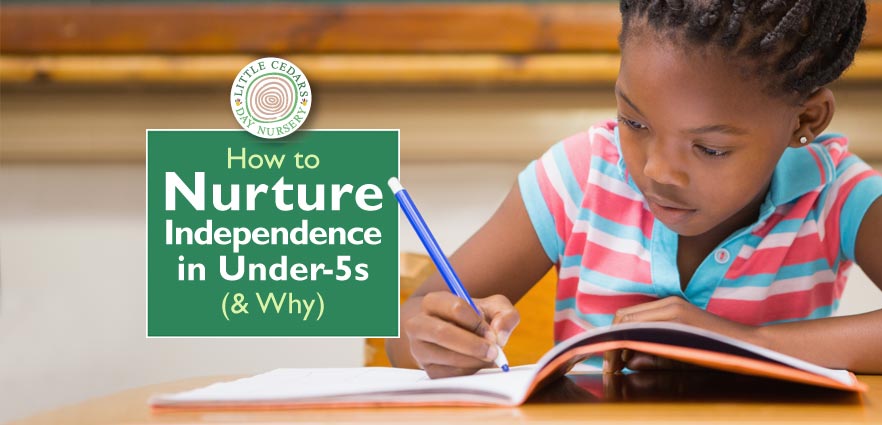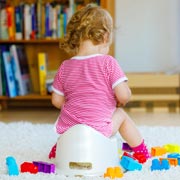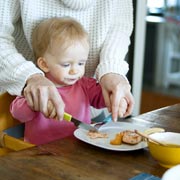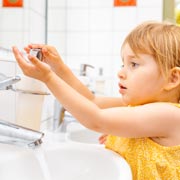
 It’s easier and often quicker for adults to take the lead in getting toddlers and under-five children dressed, fed, washed and suchlike. However, at some point, our little ones have to become confident and self-sufficient at doing these – and many other things – themselves. After all, they won’t have Mum or Dad around when they’re starting at school. So, today, we look at the ways we can help children under five help themselves and become more independent, including in their learning. First, though, let’s look at the many benefits of encouraging their independence.
It’s easier and often quicker for adults to take the lead in getting toddlers and under-five children dressed, fed, washed and suchlike. However, at some point, our little ones have to become confident and self-sufficient at doing these – and many other things – themselves. After all, they won’t have Mum or Dad around when they’re starting at school. So, today, we look at the ways we can help children under five help themselves and become more independent, including in their learning. First, though, let’s look at the many benefits of encouraging their independence.
The Benefits of Independence to Under-Fives
The benefits of young children learning to become more independent include a whole host of both short- and long-term examples. As well as helping to equip under-fives with many of the tools required for a seamless transition to school, the benefits include:
 Increased self-esteem: Children feel a sense of accomplishment when they are able to do things on their own. This can give a healthy boost to their self-esteem.
Increased self-esteem: Children feel a sense of accomplishment when they are able to do things on their own. This can give a healthy boost to their self-esteem.- A greater sense of autonomy: Children who are able to do things independently feel more in control of their own lives and have a stronger sense of autonomy.
- Improved social skills: Children who are able to do things independently are often more confident in social situations. This can often can lead to improved social skills.
- Improved relationships with peers: Children who are able to interact with others independently are more likely to form positive relationships with their peers, often leading to a better overall school experience.
- Improved communication skills: Children who are able to express their thoughts and feelings independently may learn to communicate more readily with others.
- Enhanced creativity: As children learn to play independently, they have more opportunities to explore and discover on their own. In turn, this can often foster opportunities for greater creativity and self-expression.
 Better self-management skills: Children who are used to taking care of themselves and making their own decisions are better able to manage their own learning and behaviour. This is important, particularly once they move on to a school setting. Studies published in the Journal of Educational Psychology have highlighted better grades and higher levels of achievement in this regard.
Better self-management skills: Children who are used to taking care of themselves and making their own decisions are better able to manage their own learning and behaviour. This is important, particularly once they move on to a school setting. Studies published in the Journal of Educational Psychology have highlighted better grades and higher levels of achievement in this regard.- Greater confidence: Children who are independent and confident in their abilities are more likely to feel comfortable participating in class and asking for help when they need it. This is incredibly important.
- Enhanced problem-solving skills: Children who are independent and able to think for themselves are better able to tackle new challenges and problem-solve, for example when faced with obstacles or problems.
- Improved ability to handle stress: Children who are independent and able to take care of themselves are better able to handle stress and cope with challenges.
 A greater sense of responsibility: Children who are able to do things independently may more easily learn to take responsibility for their own actions and decisions. Learning from one’s own mistakes is also one of life’s most important lessons.
A greater sense of responsibility: Children who are able to do things independently may more easily learn to take responsibility for their own actions and decisions. Learning from one’s own mistakes is also one of life’s most important lessons.- Enhanced self-regulation skills: Children who are able to regulate their own behaviour and emotions are better able to focus and therefore to learn.
- Improved physical coordination: Children who practise doing things independently, such as dressing themselves or tying their shoe laces, will naturally improve physical coordination and motor skills.
- Enhanced cognitive skills: Exploring and discovering independently can help children develop cognitive skills including enhanced memory and concentration.
- Enhanced emotional intelligence: Children who are able to express their feelings and emotions independently are more likely to develop skills associated with emotional intelligence.
Studies have shown that learning to be more independent can positively impact children’s brain development, help them to develop important life skills and even lead to them achieving higher grades at school.
How to Help Under-Fives be More Independent
Now we’ve looked at the benefits, here are our top suggestions for how to help children become more independent:
 Encourage self-care skills: Help children learn how to dress themselves, brush their own teeth, and wash their own hands. These tasks may take longer at first, but children will feel proud when they learn to do them independently. (Look out for more detailed posts about some of these tasks on the blog).
Encourage self-care skills: Help children learn how to dress themselves, brush their own teeth, and wash their own hands. These tasks may take longer at first, but children will feel proud when they learn to do them independently. (Look out for more detailed posts about some of these tasks on the blog).- Encourage exploration: Create a safe environment where children can explore and make their own discoveries. This helps them learn to problem-solve, assess risk and make decisions.
- Encourage independence during play: Children learn best through play, so give them the opportunity to play independently. This helps them to learn, develop their own interests and gather new skills in their own, natural way.
- Encourage children to express their feelings: Teach children how to express their thoughts and feelings in appropriate ways. This is healthy and also helps them feel confident and independent.
 Provide opportunities for children to make their own decisions: Give children small choices and let them choose what they want to do. This helps them feel a sense of control, encourages independence and builds confidence. A good example is allowing them to choose what they want to wear.
Provide opportunities for children to make their own decisions: Give children small choices and let them choose what they want to do. This helps them feel a sense of control, encourages independence and builds confidence. A good example is allowing them to choose what they want to wear.- Encourage children to try new things: Encouraging children to (safely) try new activities and challenge themselves helps them to discover new passions and perhaps new hobbies. While doing so, it will build confidence and independence.
- Encourage children to take on small responsibilities: Give children small tasks to complete, such as setting the table or helping to clear up after a meal. This helps them feel a sense of responsibility and independence.
- Encourage children to problem-solve: When children encounter challenges, encourage them to think through the problem and find a solution on their own. This helps them develop independence and problem-solving skills.
- Be patient and supportive: Encourage children’s independence at a pace that is comfortable for them. Be patient and offer support and encouragement as they learn to do things on their own.
 Set realistic expectations: Children are still developing their skills and abilities, so be realistic about what they can do independently.
Set realistic expectations: Children are still developing their skills and abilities, so be realistic about what they can do independently.- Provide a safe environment: Children need to feel safe in order to explore and try new things independently. Create a safe environment where children can take small risks, make mistakes and learn from them.
- Encourage children to ask for help: Encourage children to ask for help when it’s needed, but also encourage them to try to solve problems on their own first.
- Encourage children to be self-sufficient: Encourage children to do things on their own, such as packing their own lunch or getting dressed without assistance. This helps them feel more self-sufficient and independent.
- Encourage children to express their opinions: Help children feel confident in expressing their opinions and ideas. Encourage them to speak up and share their thoughts.
- Encourage children to set goals: Encourage children to set goals for themselves, which they can work towards achieving. This helps them develop independence and a sense of accomplishment. Learning to progress towards milestones one step at at time is an important life lesson.
- Encourage children to be independent learners: Encourage children to explore and learn to love learning. Doing so will help them become more independent and studies show that independent learners generally go on to achieve more.
As the huge list of benefits suggests, encouraging independence in children can have a hugely positive impact on children. Most importantly, it can really help them in the development of a wide range of important life skills. These will serve them well as they transition to school and far beyond.
Are You Looking for the Best Nursery or Pre-School in Streatham?
Excellent childcare services in Streatham from Little Cedars Nursery

 If you are looking to give your baby, toddler or preschooler the best start in life, you’ll need a high quality childcare and ‘early years’ provider. Little Cedars nursery and pre-school in Streatham provides a high quality childcare service where staff support the happy children to achieve their full potential in life and in readiness for the transition to school. The nursery is a safe, warm and welcoming home-from-home for little ones, who are nurtured and looked after by caring, high quality staff. The setting and location may also suit families who live or work nearby in Streatham Hill, Streatham Park, Streatham Common and Furzedown or Tooting, Tooting Bec, Tooting Broadway, Tooting Common, Balham, Norbury and Colliers Wood.
If you are looking to give your baby, toddler or preschooler the best start in life, you’ll need a high quality childcare and ‘early years’ provider. Little Cedars nursery and pre-school in Streatham provides a high quality childcare service where staff support the happy children to achieve their full potential in life and in readiness for the transition to school. The nursery is a safe, warm and welcoming home-from-home for little ones, who are nurtured and looked after by caring, high quality staff. The setting and location may also suit families who live or work nearby in Streatham Hill, Streatham Park, Streatham Common and Furzedown or Tooting, Tooting Bec, Tooting Broadway, Tooting Common, Balham, Norbury and Colliers Wood.
Register your baby, toddler or preschooler for a place today, or feel free to ask us any questions. Please choose a button below to get started:

